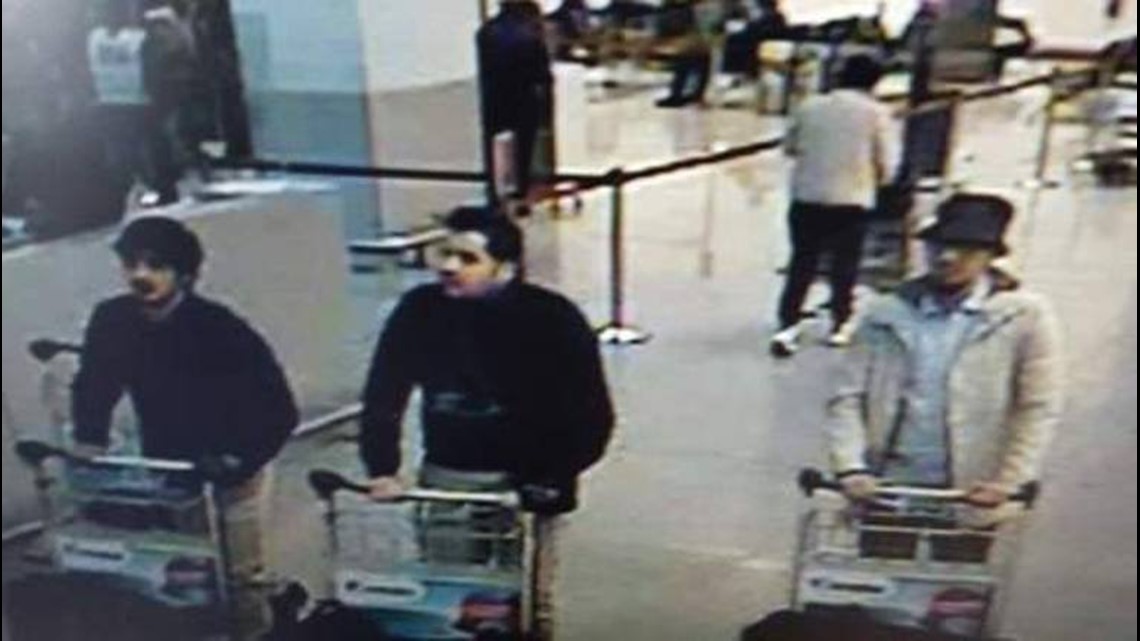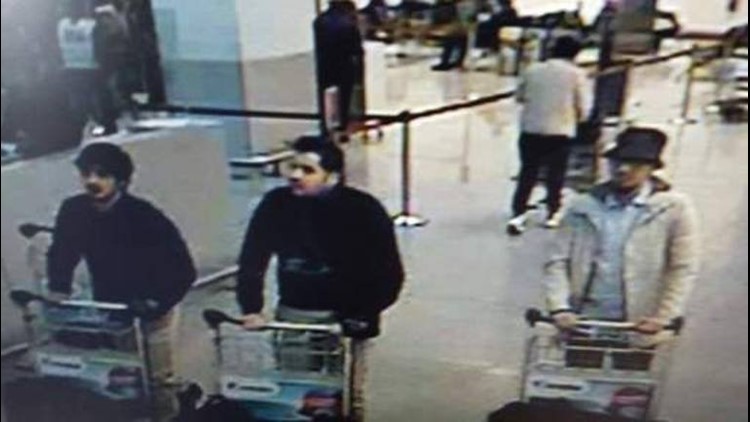

BRUSSELS, Belgium — ISIS claimed to strike yet again on European soil Tuesday, saying its “fighters” launched attacks on the airport and a subway station in Belgium’s capital that killed at least 34 people and wounded about 230 more.
While jarring, the carnage wasn’t altogether surprising. Belgium has been going after terrorist threats for months, as illustrated by last week’s capture of Europe’s most wanted man, Salah Abdeslam, in a bloody raid in Brussels.
“We were fearing terrorist attacks,” Belgian Prime Minister Charles Michel told reporters Tuesday. “And that has now happened.”
Authorities warned a suspect could still be on the loose.
A Belgian government representative told CNN that at least 20 people died at the Maelbeek metro station and 130 were wounded, plus at least 10 more were killed and 100 wounded at Brussels' international airport.
The Brussels attack suspect who authorities are seeking left a bomb in the airport, Belgian Interior Minister Jan Jambon told CNN's Phil Black. The man "left a bomb in the airport, but it didn't explode. Lucky," Jambon said. "And we are now looking for this guy."
Belgian police released a notice that includes a photograph of a suspect "wanted (for) terrorism" and asks the public, "Who recognizes this man?"
The taxi driver who drove the man and two other suspects to the airport in Brussels recognized the men in the photos, told investigators the location where he picked up the three men, prompting authorities to conduct a raid following the attacks, according to U.S. officials briefed on the investigation.
The driver recognized the men in surveillance images, according to two of the officials.
The driver also told investigators some of the men would not let him handle their suitcases, one of the U.S. officials said. The taxi driver told investigators that not all of the luggage the men tried to take with them fit in the taxi, so they left some if it behind at the residence that was later raided, according to the Belgian newspaper HLN. That's why a bomb was found at the residence, the newspaper said.
Federal Prosecutor Frederic Van Leeuw said the man is one of three shown in surveillance images pushing airport luggage carts alongside each other. Two of them "probably carried out suicide attacks," he said, while the third -- the one in light clothing, glasses and a hat -- "is actively being searched for."
Investigators have used surveillance video to track the movements of the three men in the photo, a U.S. official said. Video shows them exiting a taxi and moving through the airport, according to two officials. The man dressed in white left the airport after accompanying the other two, they said -- a move the officials said appeared to be planned.
The three people came to the airport with a suitcase, the mayor of Zaventem told the Agence France-Presse news agency. The airport is in Zaventem.
"Two of them blew themselves up at the gates, and the third was the one pushing the cart with the suitcase," Mayor Francis Vermeiren said. "We searched for this suitcase. The Belgian army looked for it for a long time. They found the suitcase and blew it up."
A Belgian government representative told CNN that 10 people were killed and 100 wounded at Brussels' international airport. At least 20 people died and 130 were wounded at the Maelbeek metro station, officials said.
The blasts sent wounded people fleeing into the streets, spurred evacuations of nuclear plants and transit hubs and led to raids in some areas as authorities searched for suspects and evidence.
Authorities in Belgium have been trying to crack down on terror threats for months as they raided homes in the area in search of suspects. Tuesday's violence came just days after investigators closed in on Europe's most wanted man, Paris attacks suspect Salah Abdeslam, who was hiding out in a Brussels suburb.
The "working assumption" is that the attackers came from the network behind November's massacres in Paris, which left 130 dead, Belgian security sources said, while cautioning it is very early in the latest investigation. ISIS also claimed responsibility for those attacks.
After Tuesday's attacks, Belgian state broadcaster RTBF reported that Belgian authorities carried out midday raids in a search for people linked to the attacks. Several witnesses told CNN they'd seen police special forces combing through the northeast Brussels neighborhood of Schaerbeek, cordoning off a train station there.
Investigators found a nail bomb, chemical products and an ISIS flag during a house search in the neighborhood, Belgium's federal prosecutor said in a statement.
After the attacks in Brussels, the home of NATO and the capital of the European Union, leaders inside Belgium and beyond vowed not to back down in their fight against terror.
In Belgium, where officials declared three days of national mourning, Belgian Prime Minister Charles Michel offered a resolute message to those who supported and cheered the attackers.
"To those who have chosen to be barbarous enemies of freedom, democracy and fundamental values ... we remain united as one," Michel said. "We are determined to defend our freedoms and to protect our liberties."
In its message claiming responsibility, ISIS noted that Belgium is one of the nations "participating in the international coalition against the Islamic State."
A Twitter post widely circulated by prominent ISIS backers Tuesday featured the words, "What will be coming is worse."
'We were fearing terrorist attacks'
One of the two airport explosions happened outside security checkpoints for ticketed passengers and near the airline check-in counters, an airline official briefed on the situation said.
The subway station blast happened about an hour later in the Brussels district of Maelbeek, near the European Quarter, where European Union institutions are based.
"We were fearing terrorist attacks," Michel told reporters Tuesday. "And that has now happened."
Belgium is no stranger to terror. "The Belgians have been sitting on a ticking time bomb," a U.S. counterterrorism official said, given all those who have traveled from the small European nation to Syria and Iraq to join ISIS, then possibly come back home.
But for survivors of Tuesday's blasts, the repeated warnings from officials in recent months didn't dull the shock of seeing the carnage.
"You cannot believe it; you cannot believe it," said Jef Versele, who was in the airport's departure hall when bombs exploded there. "It was so insane. Not in my backyard."
The second blast inside the airport blew out windows, created a lot of smoke and caused parts of the ceiling to fall, he added.
"People were on the floor," Versele said, estimating he saw 50 to 60 who were thrown to the ground and didn't seem to be able to walk.
Anthony Barrett saw the wounded carried out on stretchers and luggage carts as he watched from his hotel across from the terminal building.
"I could see people fleeing," he said.
Ties to Abdeslam?
As doctors treat the wounded and authorities search for suspects, a key question remains unanswered: Could the attacks have anything to do with Abdeslam's arrest?
On Tuesday, Belgium's Prime Minister deflected a question about whether there is any link between the attacks and the Belgium-born French citizen's capture, saying it is too early to tell.
Michel said Tuesday he had "no information" about who was responsible for the attack, adding that authorities will find that out, but now their focus is on caring for the victims.
Two senior U.S. officials told CNN they believe the Belgium attack is tied to the same network as Abdeslam.
Two nuclear power plants evacuated
Meanwhile, Belgian authorities bolstered security after Tuesday's attacks, shutting down all Brussels metro stations, evacuating the city's airport and ordering evacuations of all but essential staff at two nuclear power plants.
No flights will go into or out of Brussels Airport until at least noon Wednesday, according to Belgium's crisis center.
Several of the city's top shopping centers were closed for Tuesday and perhaps beyond, according to broadcaster RTBF, while train stations reopened at 4 p.m. "with extra security measures."
RTBF reported that the National Pensions Office in Brussels was cleared after two suspicious packages were found inside.
Several controlled explosions detonated throughout the day in the city as bomb squads disposed of suspicious packages, federal prosecutors said.
For several hours Tuesday, everyone in Belgium was urged to stay inside. That advisory was lifted around 4 p.m., though the country's crisis center urged all citizens to "remain vigilant."
After the attacks, the government raised the terror threat level to four, its highest. That step-up means army soldiers can be sent onto the streets.
European calls for solidarity
NATO, the military alliance that calls Brussels home, increased its own alert level and expressed solidarity with Belgium.
"This is a cowardly attack, an attack on our values and on our open societies," NATO Secretary General Jens Stoltenberg said in a statement. "Terrorism will not defeat democracy and take away our freedoms."
Authorities in major cities around the world ordered an increased police presence at ports, airports and train stations.
Eurostar, a high-speed railway that goes to England and France, noted a number of schedule and other changes, including canceling service between London and Brussels.
Throughout France, 1,600 more police hit the streets after the Brussels attacks, French Interior Minister Bernard Cazeneuve said.
"I express my entire solidarity with the Belgian people," French President Francois Hollande tweeted. "Through the Brussels attacks, the whole of Europe has been hit."
That sentiment was echoed by Belgium's Prime Minister during what he called "a dark time for our country."
"More than ever, I call on everybody to show calm, but also solidarity," he said. "We are facing a difficult, challenging time. And we should face up to this challenge by being united."



